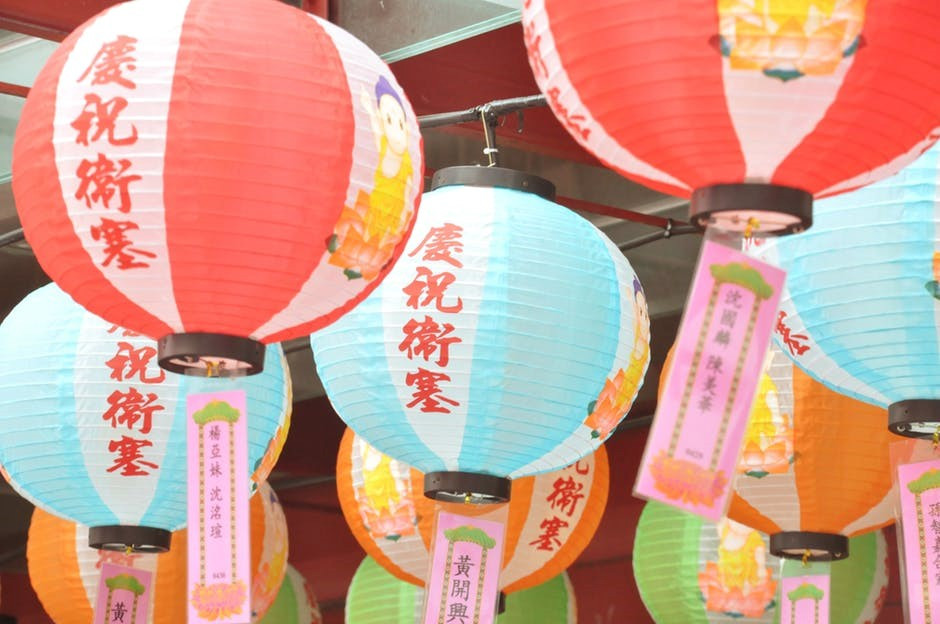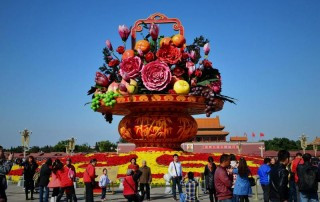Golden Week - Shenme? What is that?
Yaaay, holidays! Actually, that could be all that matters: all of us currently staying in China will have an extra week of holidays around October 1. But why? For all those who want to know about the background of their free time, we got some information here!
National Day and Spring Festival
You might have heard the term Golden Week (huáng jin zhou, 黄金周) for the holiday in October, but actually there’s not one Golden Week, but two: one in fall and one at the beginning of every new year. In January or February New Year (chūn jié, 春節) is celebrated in China. As China refers to a calendar system that is based on the moon phases, the exact date of New Year’s Eve is never the same and also different from the western date, where a year always ends at December 31 and begins with January 1. The holidays around New Year’s Eve are also called “Spring Holidays”, because for the Chinese, a year always begins with spring.
The reason for the Golden Week in October is National Day (guóqìng jié, 国庆节or shí yuè yī hào 十月一号, which just means October 1). On October 1 in 1949 the People’s Republic of China was officially founded in Beijing, and on October 2 the government stated that October 1 is National Day. Every year since 1999, National Day is celebrated as a one-week holiday.
Holiday History
Until 2007 there was a third Golden Week, which was to celebrate Labor Day on May 1. It got cancelled due to the argument that a 7-day-holiday means a standstill economy for that time. There were also plans to reallocate the free days of the other Golden Weeks and pair them with other holidays such as Mid-Autumn Festival or Dragon Boat Festival. Although the holiday calendar was revised, this never happened. In fact, after the revision there are now 11 holidays stated instead of 10! All in all, you will get to have 115 days off work in China, if you count the weekends. For workers, 5 to 10 days of that are paid holidays.
Whole China Afoot!

If you are now making plans for that week of holiday, be aware of the fact that everybody who is able to walk or even only sit in a car will be on their way to…well, wherever! One main reason for giving 7 consecutive days of holiday was that workers who live apart from their families could visit their home for longer than just a weekend. Also, many people will be on holidays or short trips, so attractions outside the cities will be crowded. Train or flight tickets are very highly requested during that time and therefore more expensive than usually. Especially transportation out of the main cities will be difficult to arrange.
If that sounded like the city would be empty: no! It is possible that there are less domestic people visiting the museums or the sightseeing attractions, as everybody is out of town. But don’t forget about the tourists! Although many tourist guides advise not to travel in China in those weeks (for the reasons above), there are plenty of them visiting during Golden Weeks.
What’s going on?
For those of you who don’t plan to go out of town it would be a great alternative to take part in the festivities in the streets. During the night there will be lots of spectacular firework shows. For Chinese New Year there will be Lion and Dragon Dance Parades, and many cultural activities will be offered. Maybe you can find some tickets for a concert or the Beijing Opera!

The Golden Weeks are the weeks of family meetings; for New Year, everybody, young and old, usually gathers at or near the place of the oldest family member. Special dishes will be served and presents are given to everybody. An old tradition are the ‘red envelopes’ (hóngbāo, 红包) that are given to children and unmarried couples to celebrate the new year. Those envelopes usually contain money in amounts that are supposed to bring luck (8 or 88 RMB for example).
As National Day is a political holiday, there will not be presents or big special dinners during that time. Still, the streets and especially the towns’ squares will be flagged and posters of important Chinese political figures (such as Mao Zedong 毛澤東) will be hung up. Beijing’s Tiananmen Square (Tiān’ānmén Guǎngchǎng, 天安門廣場), where the founding ceremony took place 63 years ago, will be decorated very festive. Sometimes – in ‘special’ years like 2009, when the PRC turned 60 – there will be military parades.
Happy Holidays!
Now that you know more about the Golden Weeks we hope you can enjoy it even better! No matter if you plan to visit the sights of Beijing or sights of Shanghai, cover the cultural corner or just relax and soak in Chinese lifestyle – enjoy your holidays!
Interested in reading more on National Day or Spring Festival? Read our articles on National Day of the People’s Republic of China and How to Celebrate Chinese New Year
Want to come celebrate Chinese festivals with us? Check out our programs here! Apply today!
Theresa Hirsch
Marketing Assistant Intern
Updated: 19/09/2018